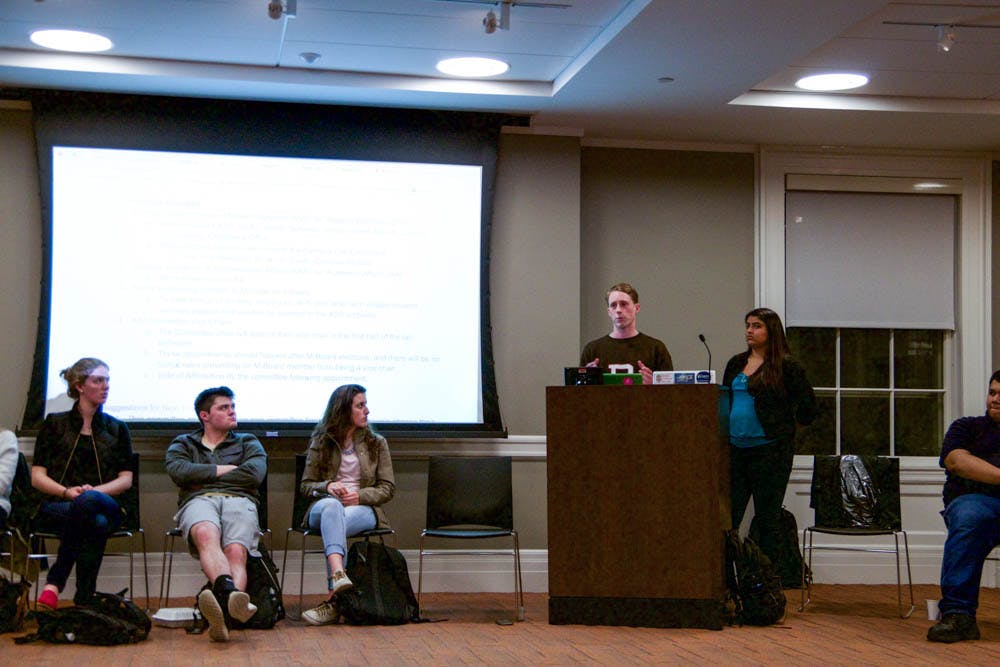The Undergraduate Council of Students is placing the final touches on one of its most active years to date. But as the semester draws to a close, it faces a familiar dilemma: convincing its general body members, who are overwhelmingly underclassmen, to stay on for another year.
Historically, UCS has been predominantly composed of first-years and sophomores seeking to gain initial experience in working for student government. The open process for becoming a general body member, which only requires collecting 100 signatures on a petition, inflates the number of first-year representatives relative to those who are older, said UCS President Sazzy Gourley ’16.
Gourley also noted that the general body is merely one piece of a larger student government puzzle, and many general body members use initial experiences on the general body to move to other areas of advocacy. “The relationship between UCS and University committees is often very fluid,” he said. “Our goal is to drive avenues and support structures to engage the highest number of students in University governance more broadly.”
UCS Vice President Alana Bhatla ’16 emphasized the role of the general body as a gateway to student government. “Our general body is a place where anybody of any knowledge level or skill can get involved in University governance,” she said. “We try to make the process as easy as possible for someone to be a voting member of our general body.”
Zachary Nelkin ’17, a current UCS general body member and a candidate for president for the last two years, expressed a different perspective. For many, he said, it “makes a ton of sense to leave UCS after freshman year.” General body members, when compared with the executive board, function as a “rubber stamp,” and rarely do major initiatives come from the general body, he added.
The only way to correct this perception is to make it more clear that the initiative of members is valued, and this is difficult to do when they are not elected, Nelkin said. Nelkin ran for president this year on a platform of structural reform, stating that the entirety of the council should be popularly elected.
Former members of UCS praised executive board leadership from past years and cited time constraints as the main factor in their decisions to leave the council.
Heather Sabel ’17 joined as a freshman and was a member of the Campus Life committee. “It seemed like something where I could have an impact,” she said. Sabel noted a major survey of campus lighting and the introduction of the What to Fix Brown digital platform as impactful initiatives begun during her stint on the council. The executive board “did a great job of making people feel like they were engaging in critical and interesting discussion,” she said.
Edwin Portugal ’17.5 brought high school student government experience to UCS when he joined his freshman year and cited similar motivations for partaking in the work of the council. The larger than average time commitment of UCS led to his leaving after one year.
In a similar vein, Jeff Salvadore ’17 decided that his work with the Brown Democrats and ARRR!!!, the Pirate a cappella group, outweighed the time he could spend on UCS. He also noted that he ran for chair of the Student Activities committee and was defeated.
Both Portugal and Salvadore said that UCS struggles with campus visibility. “I feel like a lot of upperclassmen don’t care about what UCS does,” Portugal said. “Since I was on UCS, I read the emails that are sent out, but I don’t think a lot of students do.”
“UCS does what it’s supposed to do,” Salvadore said, noting the organization’s strength in “bringing stakeholders together.” But, he added, “in day-to-day student life, it’s not that essential.”
The council is improving its communication with the student body, though there is a “clear tension” between the work being done and publicizing that work because of the busy schedules of executives, Gourley said. He cited the end of year report being released by the council and campus-wide update emails as successful communications initiatives. Bhatla mentioned the updated UCS website and promotion of the What to Fix Brown tool.
Retention reflects group members’ continued support of their organization’s mission, and as UCS has focused more on advocacy work in addition to operational projects in the last few years, the number of returning members has risen, Gourley said. UCS is “adapting both in our priorities and … our internal structure to more fully create an effective council,” he said.
As members of the new administration transition into their roles over the summer, a number of new projects will be in the works, Gourley said. The University will convene a working group to address issues related to Title VI, which deals with race and national origin, and UCS will advocate for the group to specifically focus on “intersectionality of Title VI and Title IX” among other topics, Gourley said.
Gourley also noted achievements in the four broad areas of UCS advocacy over the course of the year: student wellness, diversity and inclusion, transparent University governance and campus life and curricular improvements.
Major accomplishments of the council this year include a pledge from the University to eliminate the seven-session limit on consultations at Counseling and Psychological Services, the institution of the Diversity and Inclusion Action Plan, financial assistance with travel for international students and an increase in the student activities fee for the second year in a row. These and others will be detailed in an end-of-year report scheduled for release Friday, Gourley said.





